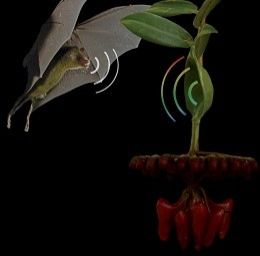A Talking Plant that Attracts Bats?: Study

A rain forest vine in Cuba attracts nectar-feeding bats with its sound, a new study said. Marcgravia evenia has leaves that bounce back echoes which are easy for bats to notice through echolocation.
"They have a very special kind of echo," said Ralph Simon, lead author and biologist at the University of Ulm in Germany. "This echo is very loud and has a constant signature from different angles," he added.
Dr. Simon trained bats in a laboratory to look for a feeder and then placed it in different locations and attached to it a dish-shaped leaf, a garden-variety leaf, or no leaf at all.
The bats were able to find the feeder in about half the time when it was attached to the dish-shaped leaf, which is beneficial to both the bats and the vine. "For the plants, it increases the success of pollination," Dr. Simon said. "For the bats, it's good because it helps them find the flowers faster - they have to make several hundred visits to flowers every night," he added.
Several hundred species of plants in the Neotropics need nectar-feeding bats for pollination, Dr. Simon said.
He and his colleagues said that they will likely find other plant species that are similarly talented at acoustic signaling.
The study appeared in the journal Science.
© Copyright IBTimes 2024. All rights reserved.





















